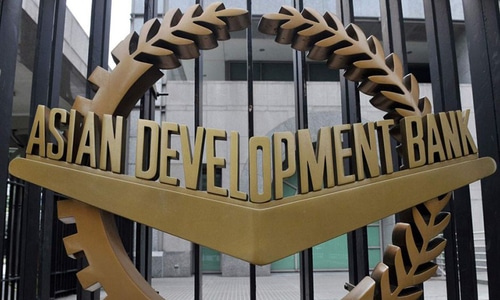The Asian Development Bank (ADB) said that political uncertainties, security issues, and external shocks continue to threaten Pakistan’s moderate economic recovery.
In its latest “Asian Development Bank and Pakistan: Fact Sheet”, the bank stated that continued fiscal consolidation and policy reforms are key to improving Pakistan’s macroeconomic recovery and stability. Particularly important are efforts aimed at broadening the tax base, reforming state-owned enterprises, improving health, education, and climate resilience, and improving private sector engagement.
“Reforms are required to promote high-value exports, expand social spending, reinforce the energy sector’s governance and sustainability, and implement structural reforms that will strengthen institutions, bring transparency, and create jobs,” read the report.
ADB further said that the forthcoming Country Partnership Strategy 2026–2030 for Pakistan will identify key challenges and development requirements, support the government in implementing key structural reforms, and boost economic resilience through a robust pipeline of public–private partnership and private sector development projects.
The pipeline will focus on mitigating the impacts of climate change, investing in the social sector, digital transformation, and good governance, and developing climate-smart infrastructure.
The report added that ADB’s operations remain aligned with Pakistan’s evolving economic and development priorities. As of 31 December 2024, the bank has committed 764 public sector loans, grants, and technical assistance totaling $43.4 billion to Pakistan. Bank’s current sovereign portfolio in Pakistan includes 53 loans and 3 grants worth $9.13 billion.
ADB provided financing for several sovereign projects in 2024 involving climate and disaster resilience, energy, post-disaster reconstruction, public–private partnerships, social protection, and transport.
ADB committed a $500 million policy-based loan for the Climate and Disaster Resilience Enhancement Program. The program will strengthen Pakistan’s institutional capacity for planning, preparedness, and response while increasing inclusive investment in disaster risk reduction and climate resilience.
As a part of ADB’s multifaceted commitment to provide $1.5 billion in total assistance from 2023 to 2025 for Pakistan’s 2022 flood recovery efforts, the bank approved a $400 million concessional loan for the Sindh Emergency Housing Reconstruction Project to help rehabilitate flood-damaged houses and community infrastructure and support livelihood recovery.
ADB committed a $320 million loan for the Khyber Pakhtunkhwa Rural Roads Development Project to upgrade around 900 kilometers of flood-susceptible rural roads in the province, including key routes that link remote communities to education, health care, and markets.
A $250 million policy-based loan for a program promoting sustainable public–private partnerships is helping the Government of Pakistan implement policies to create an enabling environment for fiscally affordable public–private partnerships and to promote inclusive economic growth.
ADB committed $200 million to modernize power distribution infrastructure in Pakistan and improve distribution companies’ ability to deliver reliable electricity. The Power Distribution Strengthening Project will focus on reducing energy losses during transit and enhancing the resilience of infrastructure against climate change and disaster-related risks.
ADB also committed $330 million in additional financing to strengthen Pakistan’s flagship social protection program. The results-based loan topped up the ongoing $627 million Integrated Social Protection Development Program, which is expanding grassroots-level social protection to alleviate poverty among women and their families.
This will include enhancing access to education for children and youth from poor families and increasing access to health services and nutrition supplies in disaster-prone areas.
Total outstanding balances and undisbursed commitments of ADB’s non-sovereign transactions in Pakistan as of December 31, 2024, amounted to $234.94 million, representing 1.82% of ADB’s total private sector portfolio.
Cumulative sovereign and non-sovereign loan and grant disbursements to Pakistan amount to $33.44 billion. These were financed by regular and concessional ordinary capital resources, the Asian Development Fund, and other special funds.
The bank said that structural and institutional factors, as well as issues such as cumbersome land acquisition procedures, procurement delays, lack of counterpart funds, and currency and price fluctuations, affect project readiness, implementation, and outcomes.
The regional development bank said that it will continue to support Pakistan’s economic recovery by strengthening public finance, social protection systems, helping with post-flood reconstruction, improving food security, social and human capital, urban services, and transport and energy infrastructure, and boosting climate action.




